What are the most important factors to consider when hiring from a remote setting? How strict should you be with interviewees regarding those tiny interruptions and sometimes less than professional backdrops? We sat down with an SHRM-CP professional to find out.
Enjoy Listening To How To Have A Proper Work Life Balance on Everyday Business Solutions?
Click Here To Subscribe On Your Favorite Platform!
About Our Guest:
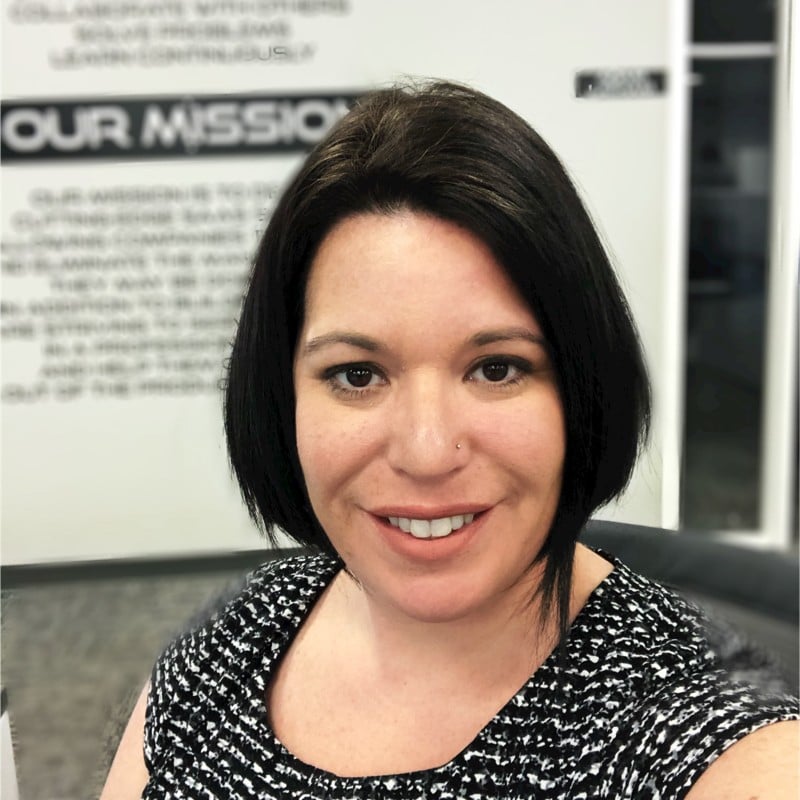
Jamie Rofkar, SHRM-CP
HR Generalist - Double A Solutions
With current shifts due to COVID-19, Jamie has had to take those processes home with her and adopt a remote interviewing process. She has taken the approach of being compassionate and understanding, realizing that not everyone has the same accommodations, especially now, and focuses instead on the factors that could make that interviewee a good addition to the team.

Episode Transcript:
Halie Morris 0:31
Hello everyone, and welcome to Everyday Business Solutions. My name is Halie Morris. I’m your podcast coordinator and host.
Today with me I have Jamie Rofkar. Jamie is actually one of my co-workers at Double A solutions. And up until recently, we work together. Jamie is currently our HR generalist, and so I’m gonna let her lead off. So we can get into the topic of hiring and recruiting in a COVID-19 environment. So Jamie, go ahead and tell us about yourself.
Jamie Rofkar 1:01
Hi, as Halie said, I am the HR generalist here. I’ve been at Double A Solutions for about a year. And up until very recently, my main focus was recruiting I had hired in the past year, I believe it was 26 people. So definitely a lot of experience in this world with recruiting and hiring. And things definitely changed in the past six months. As far as you know, I have taken on some extra responsibilities with the HR generalist role, but also just the way we’re doing recruiting, what we’re paying attention to for hiring and onboarding, and all of those things. So definitely a lot of cool things to talk about.
Halie 1:42
Yeah, so go ahead and tell us a bit about how things were prior to COVID-19. Because I think many of us are familiar with at least what our processes look like on a typical evening and 2018, 2019 when it comes to HR. So what did they look like for Double A Solutions.
Jamie 2:01
I was always really and I still am but it was always really big on a personal touch. We had more than one in-person interview so that lots of people couldn’t meet an applicant. See where they were going to fit into the company, they could see the culture by walking into the office and seeing what was going on. We so the whole process was we phone screen we had in-person interviews, then the job offer onboarding.
We also really I think, did a great job with onboarding. Haley actually did a lot of that project while we were kind of moving things around and making things better. But making sure that a new employee met everybody in the office got a tour, you know, all of those personal touch things, which is definitely something that’s changed.
Halie 2:55
Yeah, I remember we started somebody the day we transitioned to the remote. Actually…
Jamie 3:02
We did. We did. And that was super interesting. Because as quickly as we had to change, there was absolutely no plan. We didn’t know we were going remote. So to have that plan in place, it really was kind of like what’s going to work best for this person. There’s one person that starting today, what can we do to make them feel like everything’s going be okay because everything was a little bit uncertain in the world at the time. I was starting a brand new job the day everything was shutting down.
So with that particular thing, we did have the employee come in and pick up their equipment and then go home. And I stopped over at her house later that day to pick up her paperwork and fill it out with her. Because at that point, we all kind of knew something was going on. But we didn’t have the worries about the masks and the worries about six feet and social distancing. And all that we just knew kind of knew something was coming.
So that particular situation, we really individualize for that bad employee and how to move forward for that day. And then from there, okay, how can we make it a little bit smoother for the next employee? And kind of have that plan in place ahead of time?
Halie 4:26
Do you know how many employees we’ve actually started in a remote setting?
Jamie 4:33
Including that first day? I believe it’s been five full-time employees and two interns, I believe. So I mean, that’s great growth for a company during all everything that’s going on, and also has definitely given us a chance to get the policies and procedures in place.
Halie 4:57
Yeah, I remember because, for those who are listening, I transitioned into my role part way through quarantine towards the summer months. So I was still helping you with the onboarding. And we were just kind of rolling with the punches on different projects. So onboarding was an occasional thing that I helped with at that point. But obviously, it’s not just the onboarding that’s changed, coming back to that kind of the core of what so many people are perhaps facing now, as we shift back into more people going into jobs again, the recruitment and hiring climate is much different. Simply because it’s rarely in person these days. So how has it shifted for you?
Jamie 5:48
We have done everything we can to keep our process the same, but just not in person. So a lot of the process, you know, we get job applications, we do the phone screening, but then when it comes to that in-person interview, what are we going to do?
I actually had a first in-person interview scheduled for the day that we left the office. The applicant was able to be flexible, we rescheduled it for the next day, and I had to figure out how to do a virtual interview. Zoom is second nature now.
You get dressed, you get ready for work, you sit down, you have a Zoom call, or Microsoft Teams call. But at that point, I wasn’t doing anything virtually. So I didn’t even know that Microsoft Teams could do calls. We use teams at our office. I know a lot of people use Zoom or other things. But I was convinced that I needed a Zoom account, I went to our IT guy and I said I need a Zoom. I have an interview I have to do. And he said Why do you need a Zoom account, you can use Microsoft Teams. And he very nicely taught me how to use it.
So I came home, I called my best friend. And I had her walk through it with me so that we could take screenshots, and we could make a ‘how-to guide’ to share with people because it was so new for so many people. So we’ve just taken the old process, the old things that we’ve done, and we’ve put them into a virtual setting. So we still have the in-person interviews, just on the computer. And then when somebody starts we do have some people in the office, a couple of people have trickled back. So there’s somebody there to get a computer ready for them, they pick up their computer and they start working virtually as well.
Halie 7:38
That’s part of the process now, we don’t set up a computer ahead of time but we get the equipment ready in minutes and it’s done virtually. Going back to the Zoom account topic… That made me laugh a little bit because I did sign up for one, it’s nice to like sign in, and I have meetings on my Zoom line. I use Calendly, I don’t know if you’re familiar with that. But I love it!
Jamie 8:08
Not until you showed me, that’s a great virtual tool. I learned so many virtual tools that I didn’t know that I needed. But actually, I needed it.
The way that you use that with talking to so many people outside of the organization, which is also something I do with my interviews. You know, you’re talking to people outside of the organization. So it’s cool to see those other tools that are available as well.
Halie 8:32
Yeah, and that was one that I chanced upon it. The free version lets you do quite a lot for a short time. I started using it and then I talked to Sam, who’s my boss, I said, I need this. And he was actually fully willing to invest in it for me.
Anytime I’m making initial contact, I have a set of Zoom, phone call, or in-person if they’re in Toledo and they pick one. And so if in person they say well, like both set up a location later, and that usually means meeting on a patio at a restaurant that has space.
But most of the time it’s Zoom, or it’s phone calls, some people aren’t comfortable with the face to face. I don’t know how much you realize, but like what’s nice if it’s a Zoom, Calendly integrates with Zoom, so it automatically adds it to my calendar.
Jamie 9:21
Very cool!
Halie 9:22
I just sign in to Zoom and click it and open it and I’m good to go. So from my side, it’s easy. From their side, they have to go into the calendar. But it’s so much easier than it was before and I’m setting sometimes like three or four appointments a day, which I’m sure for us even more abundant. I got the free account, but I just but it was kind of like oh, I’ve never I’d never used Zoom. I’d never used Teams outside of the office either. So I can only imagine it for you, the very next day having to run an interview through it.
Jamie 10:01
It worked out very well, honestly. But, and I think so much of that is just remembering that, yes, things have changed. Yes, we’re in a different world. I have no clue how long I’m gonna be at home for, you know, my daughter is having school in the next room. That’s not something that many of us are used to doing or have anticipated.
But the world still goes on, and you, you still have to finish what you started and do things the right way. Everybody’s going through the same thing.
So having that flexibility and being able to adjust, be able to shift, focus quickly, but then also keep things going, are the real things that I’ve had to be a big focus.
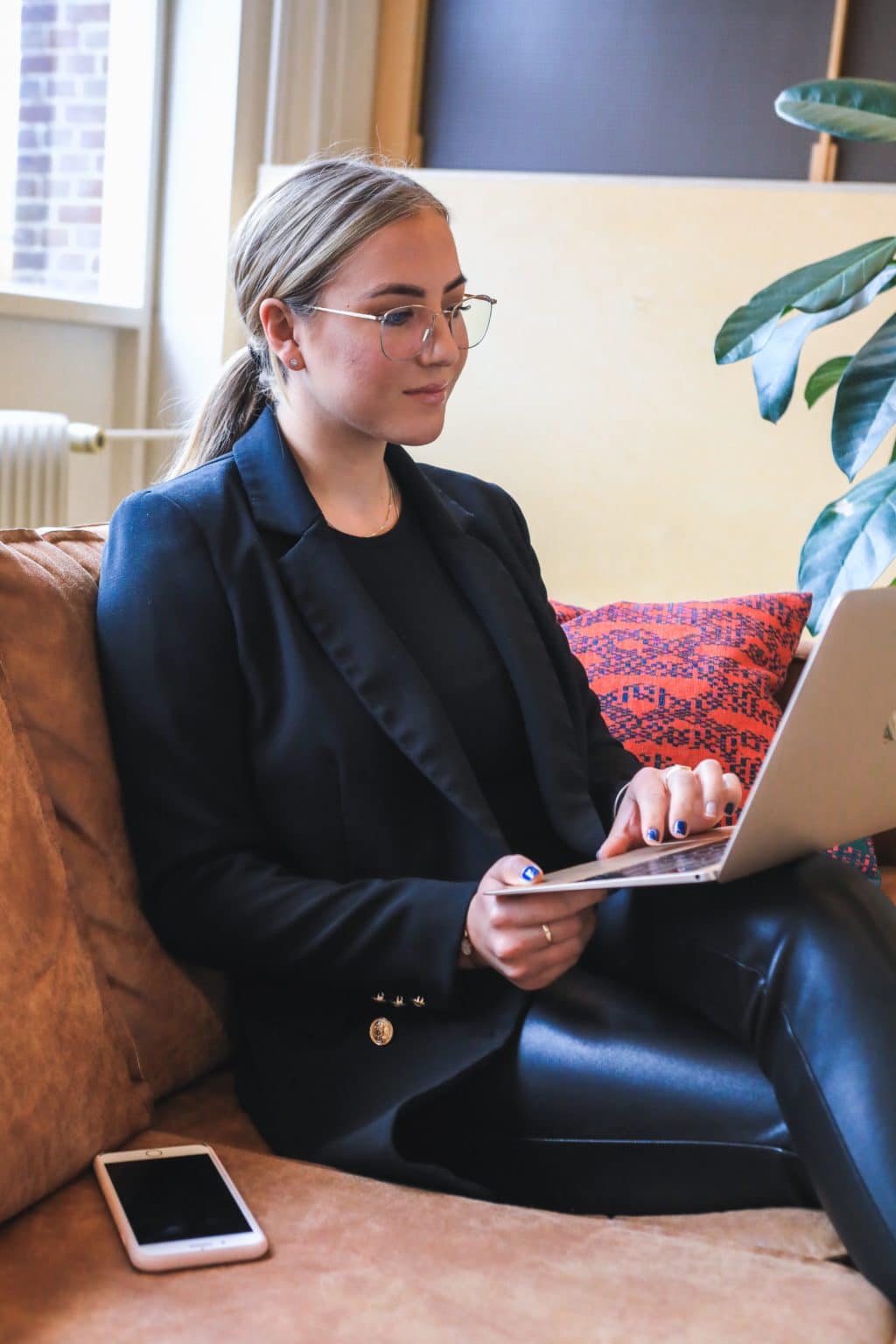
So kind of out of focus, especially in running interviews online, because it sounds like for many people, the application, the phone screening process, it’s going probably be pretty similar, if not, before.
But a Zoom call is like you’ve seen the teachers and other things face, other organizations face. When you’re in a Zoom call, do the rules in the office still apply to type questions? Do your old rules still apply? So for you, what are the big do’s and don’ts that you expect of an interviewee when you sign on for the interview?
Jamie 11:31
It’s a good question. I think every recruiter and every hiring person’s probably going to be a little bit different. And you’re going to have that with in-person and virtually. I’m making a really big effort to give everybody grace.
Like I was saying everything’s different, but everything’s different for everybody. So we kind of have to take that into consideration. Somebody might not have a stable internet connection, I was actually doing an in-class presentation yesterday for the University of Toledo and my internet just totally was gone. Like, I don’t know what it looks like on their end, but I’m sure he just dropped off the screen and, you know, their presenter was gone.
And we have to take those things into consideration and not create a bias out of it. Somebody might not have a super professional background, this is my office that I’ve cleaned up for today, it doesn’t even normally look this good. But it’s cluttered because it’s my space, and there’s no other space in my house that I can go to, honestly.
We have to remember that for other people too. From a recruiter’s standpoint, I think that the dos are to be flexible. If somebody is five minutes late for an office interview, it might rub us the wrong way. We might have to think about, hey, maybe there was traffic.
The same thing applies for at home, if somebody is five minutes late, maybe they couldn’t get connected, maybe I’m not going to call out our local internet provider, but maybe their internet provider isn’t connecting well that day, or, you know, something like that. So do give people grace. Don’t over judge what’s going on in somebody’s life, they’re looking for a job for a reason. So at work, I look at recruiting as helping people, we’re here to help them get into a company where they’re going to be a good fit, or it’s going to be mutually beneficial for both of us. So don’t write someone off just because their internet was choppy or they didn’t have on their suit and tie on like maybe they would in the office.
From an interviewee’s standpoint, from an applicant standpoint, I think you do want to remember that it is still an interview, you still do want to be as professional as you can. You want to treat it just like you would walk into a building. Do your best to be on time, wear what you would to an interview at that particular company. Know every company is different. But, you know, you want to do your best to make it like it is in person and then we as recruiters want to do our best to understand it might not be exactly like it would be in person.
Halie 14:25
That’s a good point. No, I like that. That’s, I think, especially knowing so many people who are transitioning back into the work environment, or transitioning from college to work, which is a whole new battle.
It’s important to note these things because you don’t go out and interview for a job every day on most occasions, you might have a couple of months where that’s what you’re doing because people aren’t hiring the same way or because your skillset is very niche or something like that. You know you’re not doing it every day of the year.
It’s nerve-racking, it’s intimidating. You don’t know what people are thinking. To have that perspective on the recruiter side of their human demeanor, and then also an internet connection, a computer problem, a sign-on problem that’s fixable.
A bad attitude or bad work ethic is not something that you’re going to be able to train up in an employee. So making sure you’re focusing on those things that matter?
Jamie 15:32
For sure, for sure.
Halie 15:35
So I guess, you’ve gone through this process, you’ve transitioned from your typical phone screen, your application, and perhaps your testing and things that you might do for your assessment level.
Now you’ve adapted your ‘in-person’ interview to Zoom or Team interview or really whatever video online platform you’re using. You found the perfect candidate or the perfect two candidates because there’s a lot of cool people out there.
And you want to hire them… What does that look like now? As you start to bring somebody on before you get to the onboarding, that whole onboarding process? What does your paperwork look like? What does that final signup look like? Is that different than it was before?
Jamie 16:19
That has been one of my favorite changes. When we were in the office, we did everything on paper. I’m super old school, I didn’t mind it, I liked it. But I have my notebook here on my desk that I work at and I keep everything in it. When in the office, I do everything in OneNote, and things like that. But now that I’m home, I’ve got my notebook, and I’ve filled up almost this whole notebook since we’ve been home.
But that was not gonna happen. With offer letters. I know one of the first people that we offered didn’t have a printer. So he had to go to the library to print it out, and then he had to sign it, then he had to go back to the library to scan it and send it to me, then I had to print it out. Then I had to sign it, I had to scan it back in. It was just becoming such a process that wasn’t working.
So kind of admitting that defeat, you have to be able to admit that, “Hey, maybe this isn’t the best for what’s going on right now”. When doing some research, we found a company that allows us to e-sign our paperwork. It’s been magical to me. The offer letters come back way faster because somebody just needs to click it and it puts their little signature in, it’s got a page that says everything’s official. So we’re able to get the offer letter in the background check and all that pre-employment paperwork that’s e-signed, I’m definitely seeing that where it would take three, four, or five days before just to get an offer letter back if somebody didn’t have a printer if somebody didn’t have access to be able to do certain things. I’m intending to get offer letters back on the same day, just because it’s easier.
So that’s another example like Halie, you had mentioned with the new software you’re using is able to do those e-signatures, we actually implemented an HRIS system that has allowed us to, you know, have our onboarding process be much more fluid. This keeps everyone accountable with checklists and things like that, rather than what we were using beforehand, checklists as well.
But just having it everything in one place has been very, very beneficial as well. So, like I mentioned, taking that step back saying, “Hey, what’s not working?”. And “what can we fix?” has really helped us to move forward during the six months that we’ve been at home.
Halie 18:52
It’s exciting to hear! I know you and I talked before, I am a huge fan of E-signatures because of how quick they are. But perhaps people aren’t aware if somebody is at the stage right now that they’re still doing paperwork.
And you know, they’ve not adopted things, what would you say are maybe the pitfalls or things those people should take into consideration when they’re actually considering an E signature, that maybe it costs more, or maybe they just don’t want to adopt a different process because of that training period, that learning curve that they have to get over.
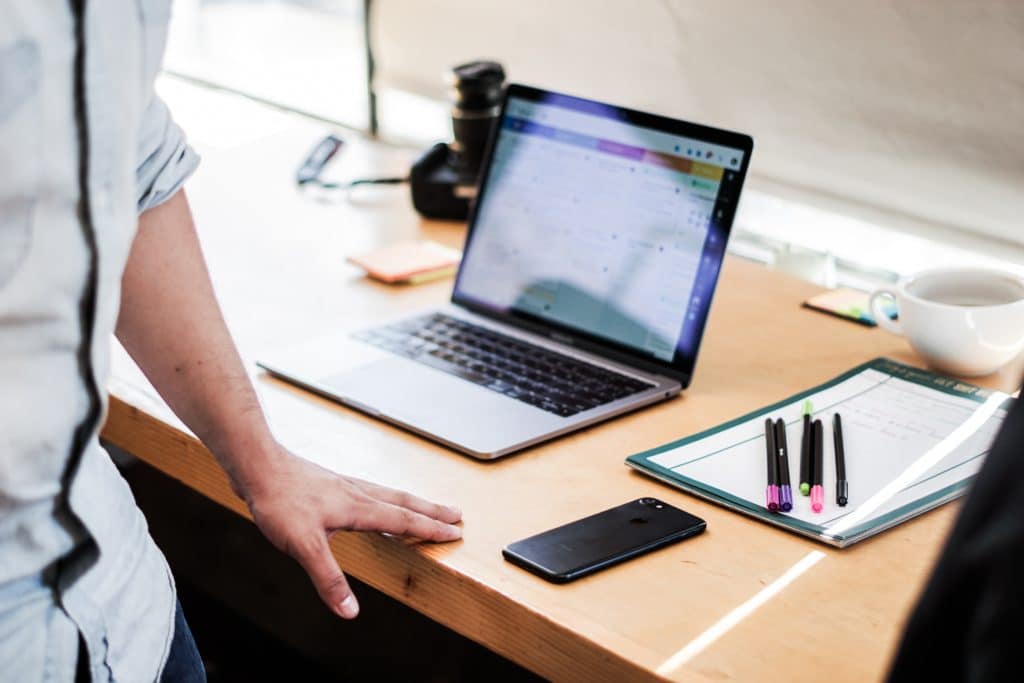
Jamie 19:28
It just comes back to taking a look at yourself and your processes and being able to say, “Hey, this isn’t perfect”.
As far as cost and things like that go there’s been a lot that has changed because of the pandemic. The system that we’re using actually always used to have costs. And since everything went home, they do now have a free version of it. Not super convenient for certain things. I’m not able to have templates, every time I put a paper in there, I have to reset it up. But it’s totally free.
So there are definitely options out there for people to be able to change those processes. And, you know, you asked about, “how do you get to that point? If there is a holdup in it, it’s just really being stronger than your hold up. Because we don’t, I went to an HR conference yesterday, that was virtual, it was super, super cool. And the keynote speaker was Trevor Noah, a super, super-intelligent guy.
And the one thing that he talked about that I really grabbed on to, is that we have to stop planning for what we’re going do when this is over because we don’t know when it’s going be over, it could be over tomorrow, or it could be over, I’m not even going go with a long one because I don’t want to jinx anything! But we don’t know when it’s going to be over. So we have to stop planning for when it’s done, and start planning for things for now, for today, and how are we going to get through this?
Halie 21:09
I would have to say that my listeners are probably sick of hearing, I think I’ve mentioned it in most episodes is that a lot of the changes we’ve seen are probably long-standing changes, they were things that are already kind of an effect, like e-signatures were becoming more and more popular. I had heard of when I was in college, I’d heard of classmates doing virtual interviews, and I was like, How does that work?
I still don’t know how that works. Because my company loves me very much. And I’m going to keep it that way. But, I at least know how to do it from the podcasting side. And I know how to operate Zoom. So a lot of things have changed. But we’re kind of moving towards that point. And I truly think some of these changes are here to stay.
Jamie 21:55
Oh, for sure. From a business perspective, absolutely. Because we’re able to see, you know, when you take that jump and you go, “Oh, no, I need to do this right”, now, you’re able to see that it actually does work.
I know, there are companies who absolutely never were going to let their employees work at home because nobody is good at working at home. And then they had to let their employees work at home and kind of were able to take a step back and say, “Oh, wait, people still are productive, people are still doing okay”, and are looking at their policies and their procedures and changing things for the future.
You look at an office setting. Now, you know, we all could be back in the office in a couple of months, but you still don’t want people to come to work sick, because that’s gonna start people being worried. And you don’t want people hiding the fact that they’re sick, because they don’t want to miss work. So you have to take a look at all your different policies and procedures. And I do think that a lot of business things are going to change in the long run.
Halie 22:59
I think so, I think so a lot, especially like the whole sick thing. I think we had a couple of people who’d been here a while and who were able to take remote when they got sick if they chose to, but it just kind of like now we have, like 80-90% of our workforce is remote. And that’s only because a couple of us have transitioned back in just for the separation or for a little more guidance if we have like the interns as an example.
So, no, I think I think that’s a great point, we are kind of transitioning, we’re transitioning very well, everybody is facing some kind of shift. And when it comes to HR and recruiting, it’s just remembering we’re human at the end of the day.
Jamie 23:47
And that’s the whole thing. They call it human resources for a reason. It’s just focusing on that people part, and remember that, you know, everybody, in truth the whole entire world is going through something at any time.
But right now we’re all going through some stuff. And whether it’s because of the pandemic or whether it’s because of other things that are going on in our worlds.
Whether it’s a big everybody thing or it’s something going on in your personal life, everybody’s going through something and being able to take that into consideration, being able to take, you know, to not have those preconceived notions about people, somebody comes upon a virtual interview or on a call like this, and you can see out their window and they didn’t cut their lawn and oh my gosh, they must be horrible. We can’t think like that, because we don’t know what’s going on and we’re invading people’s spaces by doing it this way.
We’re going into somebody’s bedroom, which is not a typical job. You don’t normally have interviews in the bedrooms. So being able to take a step back and remember that people part of it, I think is it’s always been huge. But I think it’s going to continue to be huge going forward.
Halie 25:10
I think this year, took us by the shoulders and said, loosen up.
Jamie 25:16
Yeah!
Halie 25:17
We just gotta keep it with us a bit. So, all right, I think Jamie, this is a really great place to end this conversation. We’ve talked about a lot, it’s a lot of food for thought, especially from both sides of the conversation. So do you have any other advice that you would like to offer before we close out?
Jamie 25:34
Just the biggest two things to concentrate on probably in life in general, but especially with life right now, is to be flexible, and be able to move and to give people grace, because those are the things that are going to help you to find the right person. And they’re going to help that for that right person, find your company. That’s the best fit for them. So giving people grace, staying flexible, rolling with the punches, and keep going. Gotta keep going.
Halie 26:07
Thank you, Jamie. I agree. And I’m super excited to wrap up yet another episode of Everyday Business Solutions. This one with Jamie Rofkar, who I’m a huge fan of myself.
I want to remind everybody who is listening or watching to go ahead and make sure you subscribe, that you leave us a review so that we can continue to improve and that you head over to our website and read the blog if you haven’t already. Thank you and have a good day.
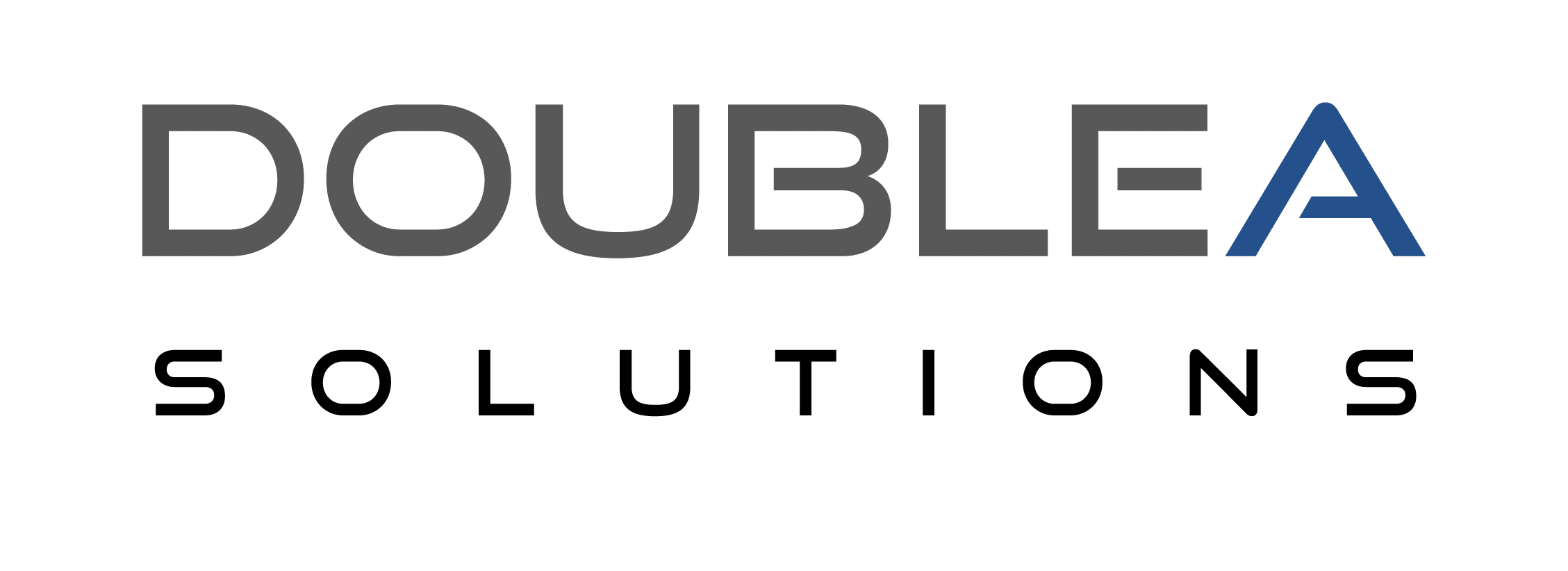
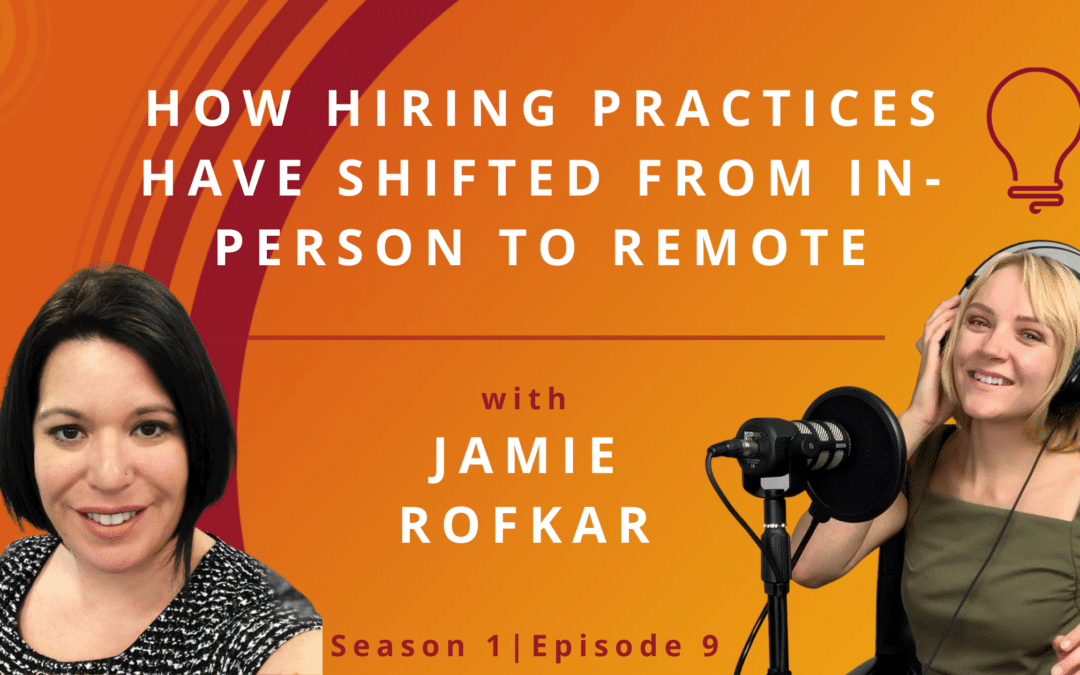
The technology enhancement leading the HR management process to make it more seamless and hassle free.
Interviewing the candidate over the internet and use of advanced HR Software leads to the factors shifting it remotely.
The technology enhancement leading the HR management process to make it more seamless and hassle free.
Interviewing the candidate over the internet and use of advanced HR Software leads to the factors shifting it remotely.